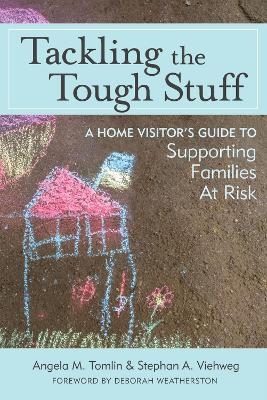
Tackling the Tough Stuff
A Home Visitor's Guide to Supporting Families at Risk
Seiten
2016
Brookes Publishing Co (Verlag)
9781598579277 (ISBN)
Brookes Publishing Co (Verlag)
9781598579277 (ISBN)
- Titel nicht im Sortiment
- Artikel merken
With the effective PAUSE framework (Perceive, Ask, Understand, Strategize, and Evaluate), home visitors will discover how to manage even their most difficult on-the-job challenges—and support and empower vulnerable families of children birth to 3.
Home visits with at-risk families present unique, complex challenges that professionals must be ready to address with skill and sensitivity. The problem-solving framework in this practical guide will help home visitors manage even the most difficult on-the-job challenges – and support and empower vulnerable families of children from birth to age 3.
The authors’ PAUSE framework (Perceive, Ask, Understand, Strategize, and Evaluate) walks home visitors through the entire process of addressing problems, from recognising a difficult situation to evaluating the chosen action steps. Readers will learn how to apply the framework in real-world situations, partner with parents to understand their perspectives, take direct and effective action to help the parents and children they work with, and give at-risk families the tools they need to resolve their own challenges in the future.
Home visitors will learn to:
Skillfully blend relationship-based and reflective practice approaches in their daily work.
Understand what’s behind children’s challenging behaviours.
Learn specific tips for helping families solve key challenges, from feeding issues to meltdowns.
Work sensitively and effectively with families facing difficult situations, including domestic violence, substance abuse, and mental illness.
Equip families with practical caregiving skills they’ll use long after the home visit is over.
Set appropriate boundaries with families and mend any breaks in the provider–caregiver relationship.
Use self-care strategies to address symptoms of burnout and secondary trauma.
Home visitors will be enabled to help parents address their child’s challenges with self-regulation; sleep problems; feeding issues; biting and hitting; meltdowns; cooperating and following directions; and fears and separation anxiety.
It includes helpful sample dialogues and vignettes to use as models, plus reproducible blank forms on exploring challenging behaviours, discussing difficult topics, reflecting on practices, helping parents improve their skills, and more. (The forms are included with the print book and available as downloads.)
Home visits with at-risk families present unique, complex challenges that professionals must be ready to address with skill and sensitivity. The problem-solving framework in this practical guide will help home visitors manage even the most difficult on-the-job challenges – and support and empower vulnerable families of children from birth to age 3.
The authors’ PAUSE framework (Perceive, Ask, Understand, Strategize, and Evaluate) walks home visitors through the entire process of addressing problems, from recognising a difficult situation to evaluating the chosen action steps. Readers will learn how to apply the framework in real-world situations, partner with parents to understand their perspectives, take direct and effective action to help the parents and children they work with, and give at-risk families the tools they need to resolve their own challenges in the future.
Home visitors will learn to:
Skillfully blend relationship-based and reflective practice approaches in their daily work.
Understand what’s behind children’s challenging behaviours.
Learn specific tips for helping families solve key challenges, from feeding issues to meltdowns.
Work sensitively and effectively with families facing difficult situations, including domestic violence, substance abuse, and mental illness.
Equip families with practical caregiving skills they’ll use long after the home visit is over.
Set appropriate boundaries with families and mend any breaks in the provider–caregiver relationship.
Use self-care strategies to address symptoms of burnout and secondary trauma.
Home visitors will be enabled to help parents address their child’s challenges with self-regulation; sleep problems; feeding issues; biting and hitting; meltdowns; cooperating and following directions; and fears and separation anxiety.
It includes helpful sample dialogues and vignettes to use as models, plus reproducible blank forms on exploring challenging behaviours, discussing difficult topics, reflecting on practices, helping parents improve their skills, and more. (The forms are included with the print book and available as downloads.)
Angela M. Tomlin is Director, Riley Child Development Center LEND, and Professor, Clinical Pediatrics, Indiana University School of Medicine, USA and Chair, Indiana Association for Infant & Toddler Mental Health. Stephan A. Vieghweg is Associate Director, Riley Child Development Center LEND, Pediatrics, Indiana School of Medicine, USA.
| Erscheinungsdatum | 02.03.2016 |
|---|---|
| Verlagsort | Baltimore |
| Sprache | englisch |
| Maße | 152 x 226 mm |
| Gewicht | 322 g |
| Themenwelt | Sachbuch/Ratgeber ► Gesundheit / Leben / Psychologie ► Schwangerschaft / Geburt |
| Geisteswissenschaften ► Psychologie ► Entwicklungspsychologie | |
| Medizin / Pharmazie ► Medizinische Fachgebiete ► Pädiatrie | |
| Medizin / Pharmazie ► Pflege ► Kinderkrankenpflege | |
| Sozialwissenschaften ► Pädagogik ► Sozialpädagogik | |
| Sozialwissenschaften ► Soziologie | |
| ISBN-13 | 9781598579277 / 9781598579277 |
| Zustand | Neuware |
| Informationen gemäß Produktsicherheitsverordnung (GPSR) | |
| Haben Sie eine Frage zum Produkt? |
Mehr entdecken
aus dem Bereich
aus dem Bereich
einfühlsame Begleitung durch alle Phasen der Stillzeit : kompetente …
Buch | Softcover (2025)
Gräfe und Unzer Verlag
CHF 25,90
entspannte Eltern und glückliche Kinder
Buch | Softcover (2024)
Trias (Verlag)
CHF 26,90


